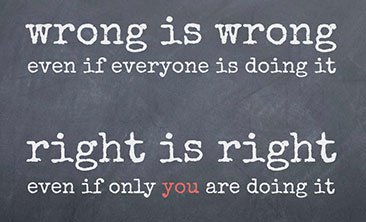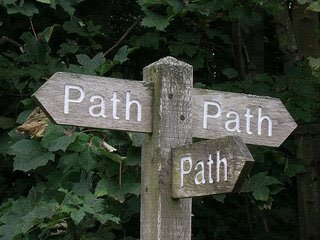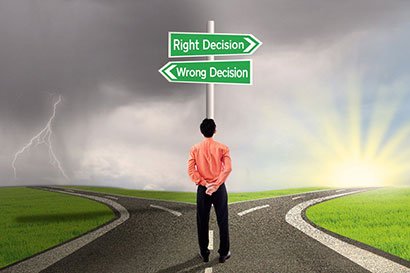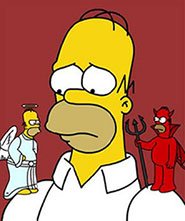Do You Care About Being Right? Why It's Good to Be Right
Do you care about being right? Or maybe it's better asked as: Do you care about being wrong? You should care about not being wrong. Not being wrong is important to choose more optimal paths to take in life.
It's an important thing to ask about our drives and motivations. Are we willing to change when we're wrong? Do we have the courage to admit we're wrong?
We won't always we right, but having the care, desire, drive and motivation to be right is important to optimize our ability to be right by choosing what's right. We can learn from our mistakes to not repeat them, and even correct them, if we care to do what's right.
If you really think abut it, it's important that you do indeed care to be right. This doesn't mean to want to be right even when you're wrong. This means that you want to have the right understanding in order to make the right decision, so that you don't make the wrong one ;)
We have many choices in life as potential paths to take.
Do we choose this or that?
Which road do we take?
What is the right path to take?
There can be 2 options we see, or 10. By comparing and contrasting their similarities and differences through logic, we can assess which options have the components that are most likely to produce the desired result we want. We narrow down all our options into picking one, the "only choice" as we often say because it's the best and most optimal choice to make out of all of the options available.
Do you want to choose the wrong path, or the least effective when you could have chosen the better one? This applies both to options you currently see, as well as to the ability to uncover additional options.
“Under analysis a person discovers that situations consist of elements, some of which are wrong and others right. If he sorts out and examines those elements, truth is easily separated from error. Some tasks of sorting are more difficult than others, but only because they are more complicated. They have more elements; therefore, they take more time to analyze, or perhaps the individual lacks knowledge of how to deal with them.
Often it is hard to collect all the pertinent facts. Some facts must be filled in by speculation, and here it is important that the speculation be done by a scrupulous person. If those analyses are continued long enough, there finally emerges a clear pattern of distinctions between right and wrong. Those who act before a clear pattern emerges are the persons whose irresponsibility is causing much of society’s trouble.”
~ Right is Might by Richard W. Wetherill, pg. 23
Eventually you realize caring about being right in our choices, and how it reflects the better choice to make, also applies to our own being, of wanting to be better ourselves. We can change, if we want to. First we need to realize the contrast of what we do and who we are now, with the possibilities that are better than that. Then we can make the choice to stay where we are or move towards something else. Without the imagination to envision a better alternative that doesn't exist yet -- for ourselves individually or for the world at large -- we won't be able to create that new reality into being.
Caring about what's right motivates and drives us to find the right path or best choice to make. The right way or best choice might not be the easiest though. The path of what's right, good, moral and true is often narrow and arduous, with trials and tribulations to overcome obstacles. While the path of doing whatever we want is wide and easy to take.
"Right is might" is the way we should live, not by the corrupt "might is right" reversal. Be right or go wrong. Truth or consequence. When things go wrong, when we make a choice we shouldn't have, we face the consequences and have the opportunity to learn from our mistakes. Chaos teaches us. Change towards the better -- towards the right, good and true -- is a natural path humanity has been taking in history. Things sometime get worse, but we keep going forward towards trying to make things better. Getting everyone to move in the same direction -- the same path and way for right or wrong -- is hard to do.
Thank you for your time and attention. Peace.




That's the most striking part, to me, about this entire post. Yes, what is considered right (might) differ from culture to culture, era to era. But if the care for what's right is there, people would be more willing to spend time analyzing what action is right. They would be more willing to admit when they are wrong, strive to amend (for) the wrong, and consciously avoid making the same mistake again in the future. In more ways than one, a lot of people are aware of what's right from wrong. But because we've basically morphed into a self-serving society, caring about "what's right" becomes obscure and instead becomes "what's right for me" for a lot of people. I'm probably (most likely) looking at this in a big scale again instead of individually but I suppose because a lot of individuals have developed thicker skin against this care, it becomes easier for others to ignore what they know as right and consequently fall into a cycle of repeating the same mistake over and over again. And people with weaker mindset would go, hey, if he can, why can't I? So many examples off my head but yeah, they all boil down to
Because if no one gives a fudge, then it doesn't matter if he/she knows what's right from wrong. He/she'll probably just go right on ahead and do whatever anyway.
That's why people are confused and think it's all "subjective", because they are making all about them... LMAO. They blind themselves by the limits of their own vision. Moral right and wrong can be objectively determined because they are based on objective actions that happen in reality. Other right and wrong decisions can be evaluated as well, despite possibly some difference based on what has higher salience for us to value and give more importance. Each situation needs to be evaluated for all information, and given underlying processes and principles of thinking, we can reason our way to recognize what's right, given the same value as our ends/goal purpose/meaning, such as morality. That's the value we need to put to drive and motivate us. Caring fro what's right, care for truth, care for moral truth :) Thanks for the feedback.
It's probably human nature to think we're the center of the universe. I guess that's why there will always be power struggles because a lot of people want to be the one to call the shots. When all they probably need is the carebears.
It's the struggle in between right and wrong where people learn the most. Being wrong and having someone correct you is opportunity to better yourself. That's why I'm all for dialogue and talking difference of opinion. It solidifies my thought if I'm right, and allows me to adjust to a better way of thinking if I'm wrong. I take argument and open debates like this dizzy wright quote.. 'I never lose I only win or learn'
Yeah, we always have to be open to being wrong and admit it once it's demonstrated so that we can align more with what's right. That's why it's important to want to be right so we want to correct ourselves. Thanks for the feedback.
Right. Wrong.
One of those slippery beasts, because sometimes there is "right" and there is "wrong" and sometimes there's just "right for YOU" and "wrong for YOU." As in peanuts might the the "right" snack for you, but the "wrong" snack for me if I'm deadly allergic to peanuts... while in a global context, peanuts merely "exist."
Don't get me wrong-- I know what you're getting at here. It's just that the majority of the world tend to confuse opinion with moral/ethical considerations of right and wrong.
Yes, I care about being "right" in the sense that I believe in "do no harm," for example. I believe that "right" exists as something that's above and beyond my own personal opinions, foibles and prejudices... and sometimes that even leads me to do things I "don't like" because I also recognize the upper layer of "rightness" that carries more importance/weight than my biases....
Yup, there is a difference between a preference or opinion, and an action that produces active right/good towards others and not the opposite of active harm/wrong towards others. There's also what's always right/correct/best/optimal given certain variables and a desired goal/outcome. In many situations people can tell what the right thing to do is given they have enough information about it, moral or not.
The words right, truth and good can apply in many different way and contexts hehe. "Good" taste like processed sugar doesn't mean it's really good for you. Thanks for the feedback.
@krnel another thought provoking post.
Would it be too much of a stretch to conflate the terms "right" and "just"?
Martin Luther King's letter from the Birmingham Jail discussed "legal" & "illegal" acts:
And there's the poem by Martin Niemoller (regardless of the controversy that surrounds the man):
Doing the "right" thing isn't always the easy or even the popular thing.
Yes. With reasoning higher degrees of consciousness, human animals can come to recognize certain aspects of living and life, and name them with word symbols, or pictographic symbols. Right, good, and true is what is just, ordered and lawful. The correlation between various words encompasses a larger framework for higher living, known as moral living, moral truth, moral law. Righteous, just, true, honest, authentic, being real, are all aspects that can be applied to ourselves as well. And this is how many ancient cultures symbolized aspects of ourselves, externalizing and projecting them as "gods" and "goddesses" in narratives to express understanding of self and reality. Of life.
In Ancient Kemetian Egypt, justice, order, law, truth, etc. was the one of two overarching foundational concepts, called maa (or ma'a), and this was personified and anthropomorphized as the goddess Maat (or Ma'at).
How far down the social ladder did these concepts, principles, teachings extend?
i.e. Were these concepts for the masses or just for the ruling class?
I think we face a similar situation now where people lower on the socio-economic ladder either aren't aware of the principles or they just don't care. The real twist is that the people at the top don't seem to care about them either.
Right makes might, and not the other way around. To be righteous should be the most important objective of everyone.
Yes indeed.
Unfortunately, sentiments and ideas trying to convince people that it's OK to believe things with no evidence, that it's a virtue to have faith and that reason is overrated are way too popular and as a result there are many people who simply wouldn't have a clue about hot to start establishing that something is or might be wrong.
Yeah, post-modernism, subjectivism and solipsism reign the minds of many, even more in subtle variations that essentially weaken their ability to think properly.
It's wonderful to get to know there are people that think alike you. Thanks for sharing. I guess we are right when we are guided by humanist values, and treat others as our brothers. I think we are right when we do good. And I'm not a moralist! But I am a moral person in the way I told you about. If you have time please consider read one or two of my posts. I would love to get your feedback too. Cheers and have a great Friday @krnel! Peace to you too
*someone recommended me to follow you. I'm glad he did :)
Thanks, will check it out ;)
Thanks a lot :)!
I love this. Now, what one person believes is right may be very different from what another person believes is right.
This, I believe, is where religion is important. Over the many years of human (homosapien) society, we have circulated around the same sets of moral (religious) beliefs / values.
I feel that these values are (have been) transcendent of time and provide us with guidance to make the "right" decisions.
Yes, religions have helped to remind people of some good principles. We must think for ourselves and figure out and verify what's right and wrong on our own though.
Speaking philosophically, how does one determine the difference between right and wrong on their own? The standards of right and wrong are always subjective. Without a common frame of reference, one may believe something is right and another may believe the same thing is wrong. Who is right in that situation? How would one decide?
Realistically, I agree, we all must make our own decisions and come to our own conclusions. We must all learn how to process our surroundings and make sensible, rational, and responsible decisions.
How would one decide! That's one of my favorite questions, what determines morality... this is a topic I've been wanting to blog about for awhile now!
No they )right, wrong) aren't subjective, what's subjective is our ability to discern based on the information we have or don't have. But we can all reason and come to the right conclusion given the same information and ability to think correctly. Distinguishing aspects of reality can be done by everyone, and recognizing harm in our objective actions int he world will determine how wrong something is in moral terms.
And still me need to give yourself the Right to Fail. Because we are all human. And are not always able to distinguish Right choices from Wrong=))
Yup, but the important things is to have that care to do what is right ;) If you don't, then why bother learning from or correcting mistakes ...
Because only after some time you can understand, what was wrong. Initially, it seems to us that everything is OK
Selective analysis. Be right to stop the debate or be wrong to face the consequences. Great post @krnel
If we have choices we have options. Just do it right. We will never need options.